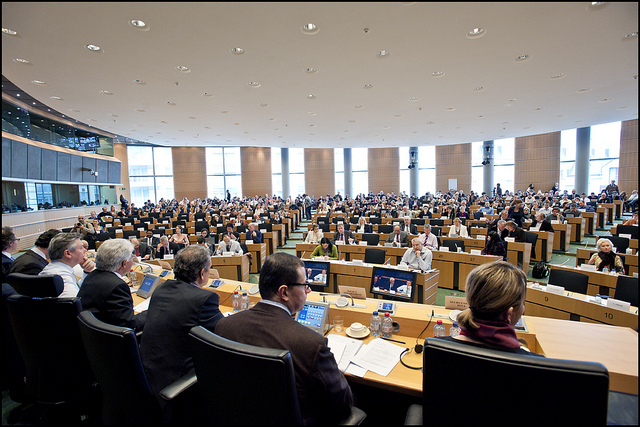What DCMS should learn from ACTA and SOPA
You could make a pretty convincing case at the moment that the European Parliament has more to say about democratic policy making than our own Department for Culture, Media and Sport.
Yesterday Javier and I were at an ACTA workshop in Brussels organised by the INTA Committee of the European Parliament. (You can read the European Parliament’s Storify summary here, and a Twitter search for #ACTAws also has lots of info). A year ago, a workshop on IP policy would have been a niche affair, dominated by promises to crack down on internet piracy and little meaningful debate or scrutiny of the proposals about how to do so.
But yesterday’s workshop saw, according to some, around 600 people subjecting those kind of proposals to the light of unprecedented public scrutiny. It was great to see the energy generated by protests and criticisms across Europe manifesting itself in one of Europe’s key decision making forums – and credit is due to the Committee for welcoming so many in to the discussion (although the chairman of the workshop had an eccentric take on what applause means!). It was especially heartening to see so many MEPs critical of the way that that ACTA was written and asking such sharp questions of its provisions.
I think it is fair to say that the representatives of the European Commission – who are seen as the villains of the piece for leading on negotiating ACTA and now downplaying many of the problems with it – got a roasting. As Professor Michael Geist said in his panel discussion, this is the kind of scrutiny and discussion that should have been happening two years ago when the agreement was being written. (You can read Professor Geist’s speech here).
With this in mind, it’s helpful to think about what’s happening in the UK at the moment. The Department for Culture, Media and Sport continue to hold closed door meetings in which industry lobbyists get to pressure other businesses like ISPs and Google into adopting voluntary schemes to police content online, with no public input (like the proposals to police search results that we revealed here). There have been two more such meetings in the past two weeks.
The Department are about to publish the Communications Green Paper, which they promise will be the vehicle for proposals for legislation along these lines if no agreement is reached in these private meetings.
As we keep saying, these kind of voluntary arrangements aren’t in themselves the end of the world. But the only people in the room discussing these agreements are the industries affected. Other perspectives are relegated to some kind of strange observer role. No public input has been sought. And the Department itself claims it has no evidence or analysis to guide what it is saying, making it difficult to understand how they will judge when an acceptable agreement is reached. How do they know what they are looking for? You wonder if the views of selected industry representatives are being conflated with good public policy.
This process shares many traits with the proposed IP laws that have stirred such anger in the recent months, first in the US regarding SOPA and currently around ACTA: closed forums for negotiation; a lack of clarity about the analysis and evidence driving policy; a serious democratic deficit.
DCMS are pursuing a model of policy making that has led copyright policy not only into further disrepute amongst internet geeks, digital rights advocates and consumer champions, but amongst growing numbers of the public as well.
The IP policy wagon has been followed this year by loud expressions of concern, most recently as tens of thousands took to the streets across Europe. The debate has made its way from the USA, with the focus on the Stop Online Piracy Act, to Europe, with ACTA the current focus. The results of the UK’s closed shop policy making will soon be revealed in the Communications Green Paper, so the UK is probably next.
When there is a room overflowing with people subjecting ideas and proposals to scrutiny in a democratic forum, as happened yesterday in Brussels, democracy seems like such a good idea.
But as much as it was heartening to see MEP’s taking up the fight, it’s a shame it was ultimately a debate about a proposal presented to the public as a fait accompli.
Private negotiation ≠ democracy. We’d urge DCMS to make sure that they open up and make their policy making a properly democratic exercise as soon as possible.

